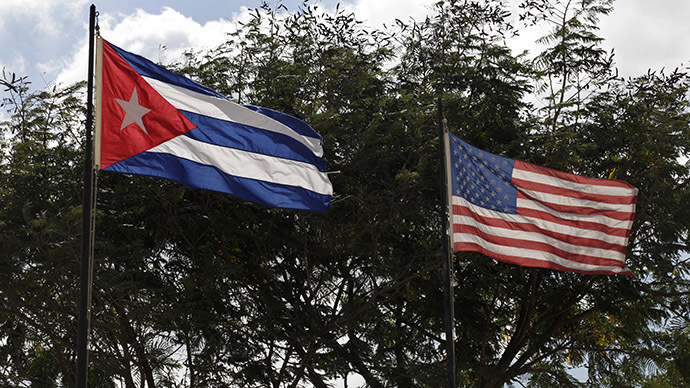Cuba, US to open embassies on/after July 20 at end of 50-year stalemate

The US and Cuba could open embassies in each other's capitals as early as July 20, Cuba’s foreign ministry has said, citing a letter from US President Barack Obama. The message comes following the decision to restore diplomatic relations.
The United States severed political ties with Cuba in 1961 after imposing an embargo on the island nation just 90 miles south of Florida a year before. Tourism to Cuba for Americans has been banned since that time. Though Cuba is still under communist rule, the Cold War mentality that has defined the relationship between the two countries over the last 50 years at last seems to be thawing.
Ambassador Jeffrey DeLaurentis, chief of the US interests section in Cuba, met Cuba’s Interim Foreign Minister Marcelino Medina in Havana on Wednesday and delivered a letter from President Obama to Cuban President Raul Castro, which said the embassies will open on or after July 20.
READ MORE: Cuba, US to name ambassadors after May 29 - Raul Castro
Since the late 1970s, Cuba and the United States have had a type of diplomatic mission in each other’s capitals called “interests,” which do not have the same status as full embassies.
Speaking in the White House’s Rose Garden, shortly after 11 am local time, President Obama said the US policy of sanctions and isolation has not helped the cause of democracy in Cuba.
“We don’t have to be imprisoned by the past. If something isn’t working, we can and will change,” Obama said. “The best way for America to support our values is through engagement.”
Washington severed relations with Cuba after revolutionaries led by Fidel Castro overthrew the US-backed dictatorship of Fulgencio Batista. Noting that he was born in 1961, Obama quoted President Eisenhower’s hope that ties with Cuba would be renewed someday.
“It took a while, but I believe that time has come,” Obama said.
A senior State Department official confirmed that arrangements for the embassy’s operations have been negotiated with the Cuban government.
“We are satisfied with the conditions agreed to, including access to diplomatic facilities, travel of diplomats and the level of staffing,” the official told reporters, speaking on condition of anonymity. “These conditions are acceptable for carrying out the core diplomatic functions necessary for implementing the president's new policy direction on Cuba.”
This comes as a major step in the Obama administration’s push for a full diplomatic thaw, which began with the US and Cuba announcing on December 17, 2014 that they would move to mend previously hostile relations. Since then, the United States has loosened travel restrictions and allowed some new economic ties.
Obama met with Raul Castro during a summit meeting in Panama in April, the first time that the leaders of their respective countries had met in more than 50 years.
In June, the US removed Cuba from its “State Sponsors of Terrorism” list, which was a major obstacle in way of the renewal of cordial relations.
The Obama administration has long supported engagement with the island country, and insists that the embargo has been ineffective.












